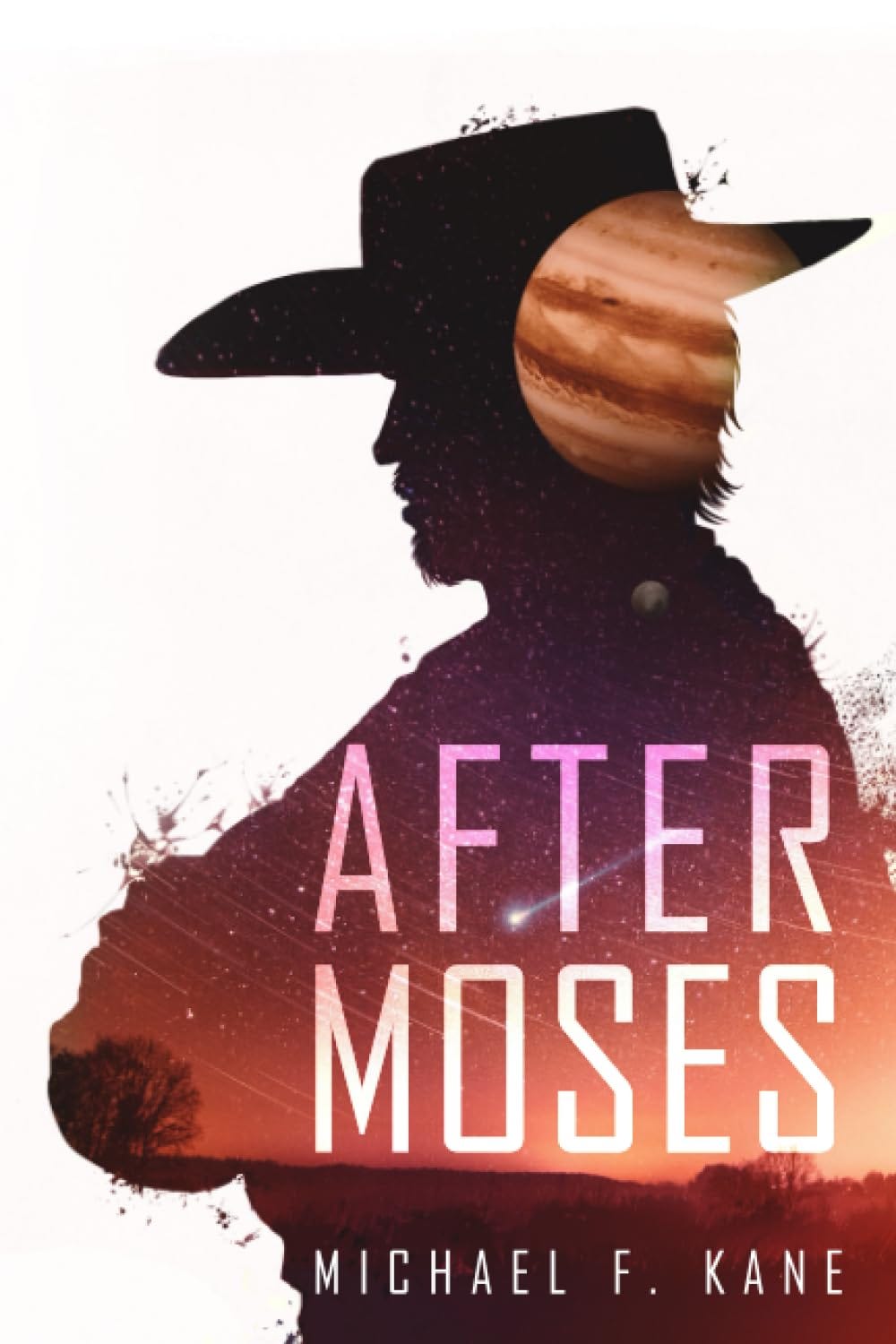Review: After Moses by Michael F. Kane
A Loner Spaceship Captain Adopts a Small Crew, and Together They Just Might Save Humanity
Who doesn’t love a good space western? That’s basically what Star Trek was (before NBC canceled it in its third season). And of course Firefly has a cult following of its own (despite getting axed by Fox almost as soon as it started). Despite those setbacks we’re still revisiting those stories today, which proves there’s a market. Maybe you’re in the market.
After Moses is set in a future where a benevolent AI called Moses equipped humanity to colonize the solar system. For reasons explained in the book, many of the colonies adopted the style of the American west. One day Moses disappeared. Civilization nearly came apart and scientific advancement ground to a halt. Now people are just trying to survive. Matthew Cole’s means of survival is freelancing, traveling between the planets and moons in his ship, the Sparrow, taking whatever odd job comes his way.
The Story
Like the aforementioned TV shows, After Moses is episodic. The stories start small, gradually building out the cast of characters and the world. Switching genres for a bit, After Moses is to Star Trek what Burn Notice is to The A-Team. You can start in the middle, but you shouldn’t. Ever so slowly (and this isn’t a criticism), a plot takes shape which builds to a major climax.
Thanks to the nature of Cole’s work, there’s no lack of variety in the predicaments in which he finds himself. One week he might be tracking down a family heirloom, the next he could be lassoing a meteor, catching fuel thieves, or transporting contraband cheese. Or maybe trouble finds him and he has to deal with it pro bono.
As his crew grows new point of view characters are introduced. This means that there’s always something happening and makes for a narrative that’s engaging and ever expanding.
The Characters
Though absent, the memory of Moses looms large over the story. “Moses represented something unique in the history of mankind. For the first time, a force outside of man’s own acted upon the species as a whole. There was a guiding impetus, a mind that was other, directing the course of history. The question was whether or not it was infallible.”
Matthew Cole is a freelancer who dresses like the Man with No Name and has a taste for cherry soda. There’s something in his past that gave him his moral code and made him a loner, but we don’t need to know why right away.
When Cole meets Abigail Sharon (aka: The Shield Maiden) she’s the competition. In her mechanized suit she’s an almost unstoppable giantess. She has wounds of her own, but prefers losing herself in classic literature to opening up. When things get too hot for her on Mars, she reluctantly becomes the first member of the Sparrow’s crew.
To say more would give too many spoilers. Suffice to say, the focus remains on those who come aboard the Sparrow and eventually a shadowy villain from Cole’s past.
The World
Moses opened up the entire solar system to humanity. Cities adorn all the planets and some of their moons, but without the aid of an all-knowing AI life is becoming a little more primitive. There’s even a fanatical movement which believes everyone off-Earth should die and is eager to help the process. The various world powers no longer exist, nor does contact with Earth, though the Catholic Church remains a significant presence. Unfortunately, without an interplanetary government, various cartels use slave labor to fund their organizations.
What technology there is tends to be fairly grounded, though some items, called miracles, are practically magic. Vat grown meat is the norm. There are no non-humanoid species or other AI since the departure of Moses.
The Politics
There may be subtle, right-leaning metaphors, but nothing overt and they may simply be organic to building a rational world.
Content Warning
The only expletive is in Spanish and translates to, “My milk has gone sour!” Violence is frequent, just not graphic. There’s some talk of human trafficking, but the reader is left to summarize what that may entail. Overall, this is about as PG as you can get.
Who is it for?
I’m probably going to take some heat for this, but I’ll say it anyway: After Moses is better than Firefly, better than Star Trek, and if you question if that’s even possible, this is for you.
Why read it?
How many gallons of digital ink have been spent mourning the premature death of Firefly, writing fanfic, and opining on its significance? After a certain point you’ve just got to get over it. Firefly is deader than a leaf on the wind. Fortunately, in the world of indie there’s always something new to fill the void. Michael F. Kane tapped into what we loved about that IP and used his understanding to craft something imaginative, inspired, and impossible to cancel.




Thanks for the review. I am going to recommend it to my partner 🙂.
I noticed After Moses and have been meaning to check it out. This just moved it up my list.